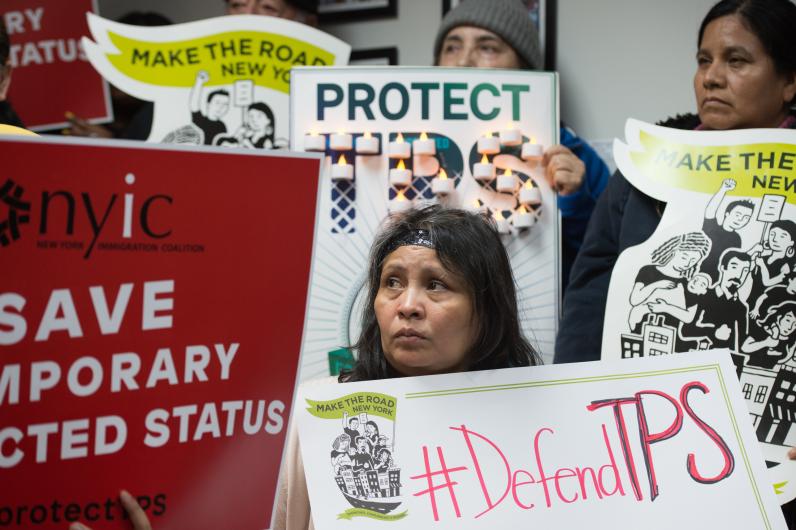
Immigrants, activists and elected officials hold a press conference to demand that the Department of Homeland Security extend Temporary Protected Status (TPS) for more than 195,000 Salvadorans on January 8, 2018 in New York. BRYAN R. SMITH/AFP/GETTY IMAGES
What will happen to the girls and women deported from the U.S. to Central America? Many fear the answer.
The Trump administration said last week that, by September 2019, it will deport 200,000 Salvadoran immigrants who have been allowed to stay and work legally in the U.S. thanks to temporary protected status, or TPS. Nicaraguans, too, will only receive protected status for another year, and Hondurans could be next to face deportation.
Women and girls, though, are in the most danger. Stripped of TPS, they now face not only the fear of family separation, but also the prospect of returning to a country which has one of the highest rates of violent homicide of women in the world. Deportation could be a death sentence.
Violence against women is a major concern in Central America. The MS-13 and Barrio 18 gangs operating in El Salvador, Guatemala and Honduras are considered the most violent criminal groups in the world. Rape is used to intimidate, to demonstrate loyalty and to claim girls as gang property. The International Crisis Group, for example, cited a former Barrio 18 female gange member who said, “It is unbelievable how violent they [gang members] can get … how they treat their wives and mothers.”
El Salvador was second only to Syria in the rate of violent female deaths between 2010 and 2015. And every 18 hours, a woman is killed in the Central American country. “In El Salvador, women are terrified, especially young women,” says Vilma Vazquez, founder of Las Dignas, a feminist association in El Salvador. “We know we’re going out but we do not know if we are going to get back home alive.” If pregnancy results from rape, a woman in El Salvador does not have the option to terminate the pregnancy. As the Fuller Project for International Reporting reported last year, El Salvador has one of the strictest anti-abortion laws in the world.
Immigrants who flee sexual violence in their home countries can apply for a special form of asylum in the U.S., but it is rarely granted. “If you go through traumatic violence it’s difficult to disclose to government officials especially after the journey,” says Cecilia Muñoz, former policy advisor to President Barack Obama and now vice president at the New America Foundation. “To the extent that it comes out, it’s in the application for asylum, if the woman is well-represented.”
Read the full article here.



